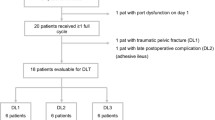Abstract
Focusing our effort on the importance of FUra scheduling we have tested the hypothesis that pulse and continuous infusion (CI) of the fluoropyrimidine have different mechanisms of cytotoxicity. Our initial approach was to compare the mechanism of resistance of a cell line resistant to a short term exposure to FUra (HCT-8/FU4hR) to that of a cell line resistant to a prolonged exposure to the fluoropyrimidine (HCT-8/FU7dR). Cytotoxicity studies showed that HCT-8/FU4hR cells were still sensitive to FUra given as a 7-d exposure, suggesting different mechanisms of resistance. Indeed, rapid recovery of TS activity after drug removal was evident in the HTC-8/FU7dR cell line while HCT-8/FU4hR cells were similar to the parental cell line with regard to both the degree of in situ TS inhibition by FUra and duration of inhibition after FUra removal. In contrast, labelling studies with [3H-6] FUra (4 h exposure, 100 μM) showed that the incorporation of the fluoropyrimidine into RNA is significantly decreased in HCT-8/FU4hR cells as compared to parental HCT-8 cells.
Given the lack of cross resistance between the two schedulesin vitro, a pilot trial was done on patients with colorectal cancer refractory to bolus FUra. On 15 patients failing after FUra+LV or FUra alone 1 PR, 3 MR, 3 SD and 8 P were observed, confirmng a certain degree of activity of CI FUra in patients clinically resistant to bolus FUra.
Based on this rationale, a phase II trial of schedule-oriented biochemical modulation of FUra in advanced colorectal cancer patients was conducted, employing a hybrid regimen of 2 biweekly cycles of FUra bolus (600 mg/sqm), preceeded by (24 h interval) methotrexate, 200 mg/sqm (in order to maximize the RNA effect of the drug) alternating with FUra continuous infusion, 200 mg/sqm daily for 3 weeks, modulated by leucovorin, 20 mg/sqm weekly bolus (in order to maximize the DNA effect).
Thirty-three consecutive patients (median ECOG PS 1) with advanced measurable colorectal cancer and no prior therapy for metastatic disease entered the study, from February 1992 to August 1993. Three complete and 13 partial responses were obtained among these 33 patients (RR=48%, 95% confidence limis, 31–66%). After a median follow-up time of 23 months, 16 patients are still alive. The median progression free survival and overall survival were 9.6 and 20.8 months, respectively. No toxic deaths or grade 4 toxicity occurred. The incidence of grade 3 toxicity per patient in any cycle was: mucositis 6%, diarrhea 3% and vomiting 3% for the bolus part and 21%, 3% and 6% respectively, for the continuous infusion part of the regimen. Hand-foot syndrome occurred in 27% of the patients treated with the continuous infusion regimen.
In conclusion, this experimental and clinical project has generated a novel regimen of schedule oriented biochemical modulation that is twice as active and half as toxic compared to bolus FU+LV given with either the daily x 5 or the weekly schedule. This high clinical activity is very encouraging, especially considering that 1) consecutive patients were entered, 2) the responses were independently reviewed, 3) the progression free survival and survival were much longer than those actually reported for this disease, 4) the toxicity of the program, in particular the bolus regimen, was relatively low allowing further intensification.
Similar content being viewed by others
References
Aschele C, Sobrero A, Faderan MA et al. (1992) Novel mechanisms(s) of resistance to 5-fluorouracil in human colon cancer (HCT-8). sublines following exposure to two different clinically relevant dose-schedules. Cancer Res. 52:1855–1864.
Izzo J, Zarba J, Rougier PH et al. (1992) Low dose of 5-FU continuous infusion (FUCI) in advanced colorectal cancer (ACC): clinical evidence for reversal of required/intrinsic resistance to 5-FU or 5-FU Folinic acid (FUFO). Proc Amer Soc Clin Oncol, San Diego, California, 19–24 May.
Lokich JJ, Ahlgren JD, Gullo JJ et al. (1989) A prospective randomized comparison of continuous infusion fluororacil with a conventional bolus schedule in metastatic colorectal carcinoma: a Mid Atlantic Oncology Program study. J. Clin. Oncol. 17:425–432.
Moran RG and Scanlon KL (1991) Schedule-dependent enhancement of the cytotoxicity of fluoropyrimidines to human carcinoma cells in the presence of folinic acid. Cancer Res 51:4618–4623.
Mori A, Bertoglio S, Guglielmi A et al. (1993) Activity of continuous-infusion 5-fluorouracil in patients with advanced colorectal cancer clinically resistant to bolus 5-fluorouracil. Cancer Chemother Pharmacol 33:179–180.
Poon MA, O'Connell MJ, Moertel CG et al. (1989) Biochemical Modulation of fluorouracil: evidence of significant improvement of survival and quality of life in patients with advanced colorectal carcinoma. J Clin Oncol 7:1407–1417.
Seifert P, Baker LH, Reed ML et al. (1975) Comparison of continuously infused 5-fluorouracil with bolus injection in treatment of patients with colorectal adenocarcinoma. Cancer 36:123–128.
Shaah A, MacDonald W, Goldie J et al. (1985) 5-FU infusion in advanced colorectal cancer: a comparison of three dose schedules. Cancer Treat. Rep. 69:739–742.
Sobrero A, Aschele C, Rosso R et al. (1991) Rapid development of resistance to antifolatesin vitro: possible clinical implications. J. Nat. Cancer Inst. 83:24–28.
Sobrero A, Aschele C, Guglielmi A et al. (1994) High activity and low toxicity of alternating bolus and continuous infusion 5-fluorouracil with schedule-oriented biochemical modulation in advanced colon cancer patients. Proc of the third Annual Meeting of ASCO, abs. 588.
Author information
Authors and Affiliations
Rights and permissions
About this article
Cite this article
Guglielmi, A., Aschele, C., Grossi, F. et al. Alternating bolus and continuous infusion 5-fluorouracil: a strategy to overcome resistance to this fluoropyrimidine in advanced colorectal cancer patients. Cytotechnology 19, 215–219 (1996). https://doi.org/10.1007/BF00744215
Issue Date:
DOI: https://doi.org/10.1007/BF00744215




